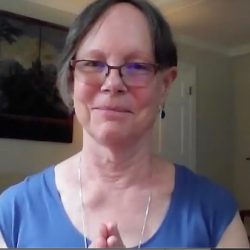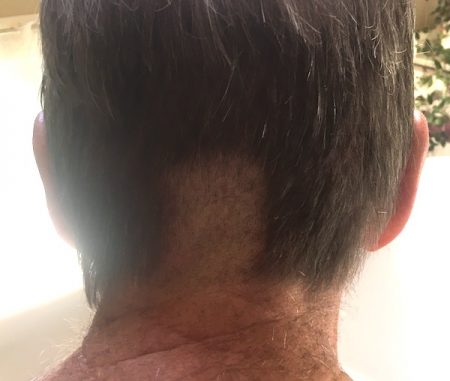Anne Gosling says she has always been inclined toward contemplation. She sees herself as a seeker — someone who likes to explore deep and meaningful questions, such as why are we here? What is the meaning of life? What should I be doing with my life? Is there a God?
About 15 years ago Anne attended a class on Mindfulness-Based Stress Reduction or MBSR.
I was just curious about it and had an opportunity because I was teaching at Syracuse University. We could take one class each semester and I had a little open time and I took the first offering they had of this eight-week class on mindfulness meditation, mindfulness-based stress reduction.
Anne Gosling, Ph.D., MBSR, Mindfulness, and Yoga Teacher
The 8-week class was transformative and ever since MBSR has played an integral role in Anne’s life.
I would say I experience it as a path, as a way of being in the world and a way of approaching life that has infinite applications. At its heart, I think it is about meeting life as it arises and giving us ways to see things more clearly and to make more skillful choices. It enables me to meet interior and exterior turbulence in ways that other practices haven’t.
A lot of people come to MBSR when they hit something really challenging in their life and they’re grappling for some way to deal with it at. I simply came to it out of curiosity and so, it’s amazing to me.
Anne
The MBSR class that Anne attended was developed by Dr. Jon Kabat-Zinn at UMass Medical Center. Kabat-Zinn founded the Mindfulness-Based Stress Reduction Clinic in 1979 and the Center for Mindfulness in Medicine, Health Care, and Society in 1995. He is also the author of several books. He defines mindfulness as “the awareness that arises through paying attention, on purpose, in the present moment, non-judgementally in the service of self-understanding and wisdom.”
Decades of research has shown the positive impact mindfulness and mindfulness meditation can have on people’s physical and emotional health.
They started doing research on it right away and there’s a lot of documentation of the ways in which it’s beneficial both for physical issues that are going on but also mental health and emotional issues, whether it’s anxiety or depression or it’s high blood pressure or chronic pain.
Anne
The practice of cultivating mindfulness had such an impact on Anne that she completed teacher training at the UMass Center for Mindfulness. Until COVID-19 came along, she had been teaching MBSR and restorative yoga to people in the community at the MaineHealth Learning Resource Center. Then she started leading an online weekly mindfulness meditation group offered by Thomas Memorial Library in Cape Elizabeth, Maine. She called it Cultivating Mindfulness in Turbulent Times.
Because of COVID and other things that are happening in this country and around the world right now, we are all experiencing what one of Anne’s teachers calls “an attack on the human race.” Anne thought about how we are all affected and in different ways and realized that it was an opportune time to help people cope with an overload of stress by teaching them how to do mindful meditation.
All of a sudden, for some of us, the structure of our lives has been so shifted that it really alters life. I think for people like that it can be a wonderful opportunity to find ways to be more present. Ways that aren’t always possible when there are so many things on the plate and you’re juggling so much and it’s not comfortable. I also think of some of the people who are on the front lines and may be dealing with a lot of trauma and feeling overwhelmed. That would be another reason why you might be looking for some way to cope with your life that would be quite different.
Anne
We all need some level of stress in our lives to motivate us, but not the overload most of us are experiencing right now. Mindfulness won’t magically take it all away, but it can help draw your attention to what is happening for you in the moment. It allows you to connect to your inner resources to meet whatever it is that you are feeling with kindness and compassion.
The practice is not to try and get rid of stress but to find a way to be with it, just to allow it to come and go like clouds in the sky. People may say, well, I tried meditating but I couldn’t do it. To me, that’s probably one of the barriers for some people. They have an idea and think it’s going to produce something — I’m going do this and it’s going to make this happen.
Anne
But in the moment, mindfulness meditation can make you feel calmer. I can attest to that because ever since I’ve been staying at home, I have begun a morning practice. I use elements of it throughout the day, especially trying to breathe mindfully when I’m upset about something or imagining how calm and serene I felt at the end of a meditation.
It even helped me when I had a meltdown of epic proportions when I trimmed the back of my husband’s hair. I’d watched some videos and trimmed it twice before, but because I was/am still a total novice, I didn’t realize the guard wasn’t on the clippers. I was so proud of the fact that I thought I had the upward motion of the clippers down pat. So I dove right in and used the same motion to trim just above the nape of his neck. Only because the guard wasn’t on, I created a perfect landing strip up the middle.
I ran from the bathroom with my head in my hands crying “Oh, my God, oh, my God, what have I done?” And when I dared to assess the damage, I began laughing hysterically. It was not pretty. My husband’s hair or my reaction. He remained calm and I eventually evened things out the best I could. Sorry, no after picture. A short while later, I meditated and felt better, much better. And of course, I learned a valuable lesson about trimmers.

A highlight of my week during the height of the pandemic was Anne’s online group at the library. Many of us were strangers to each other, but in that hour we were connected and it was wonderful. Anne led us in a meditation and after, a brief discussion.
The library group ended last summer, but because it had become so important to all of us, including Anne, she agreed to continue it on her own. For many reasons, times are still turbulent and our group seems even more important than ever.
If you think you might benefit from a bit of calmness right here and now, listen to the audio below and let Anne lead you in a very soothing meditation. It’s 16 1/2 minutes long. You’re worth every second.
There are also free meditation apps available. One that Anne recommends and that I often use, as well, is Insight Timer. It’s free and you have access to an abundance of guided meditations of all lengths, music, and courses. Two other apps you might try are Headspace and 10% Happier.
I hope you will at least give meditation a try. I gave you several options hoping to cancel out any excuses! I have become quite mindful of how the moments can fly by when you’re spending all or most of your time at home. It seems to happen whether you have plenty or nothing to do and it’s a perfect setup for procrastination. So don’t waste a moment. Meditate with Anne. Download an app. Simply sit. Nurture yourself.


What a lovely piece about such a lovely person. Please send our warm regards to Anne Gosling, our old friend from Old Sturbridge Village days. What a wonderful right livelihood life you are leading, Anne.
Best,
Bill and Peggy Tramposch
Mendocino, CA. 95460